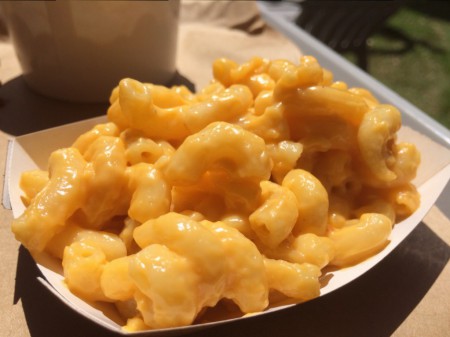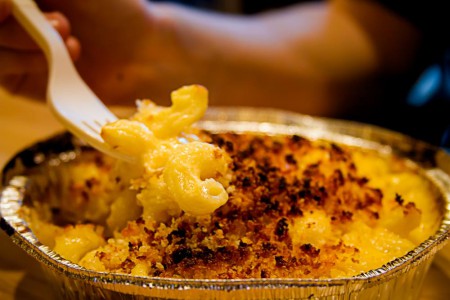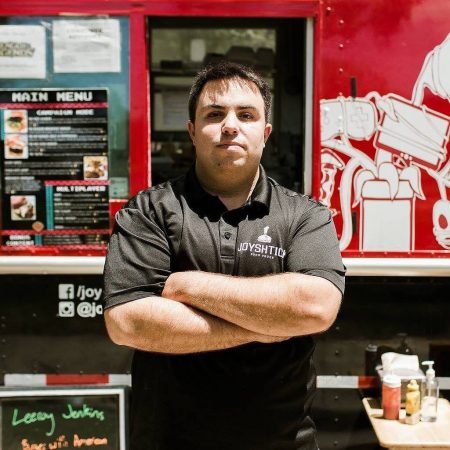So I was hand-crafting Mac n Cheese the other day. I used a recipe that a friend shared with me which does not require a roux, quite intentionally on my part, because the process of making one is my personal Trail of Tears. The recipe that I was following (recipe is even a pretty strong word for it) takes milk, American cheese, and noodles (and seasoning of course); the staples of a good mac. The American cheese has a property that thickens the sauce, so as soon as the milk is hot you’re pretty much just “making it rain” Kraft singles into a pot of moo juice. Even I can handle something that simple with only a hiccup or two as opposed to cheese-ageddon from a more complicated process.

Speaking of cheesy end times scenarios, that’s pretty much how this particular instance resolved. I had added a large amount of cheese and mixed thoroughly until the sauce was a nice yellowy orange color. I tasted the concoction, and I couldn’t really tell if it was cheesy enough. So I made it rain in the club, Kraft singles for all the ladies. Still didn’t really remind me of cheese. Make it rain. Now my sauce tastes like a liquid slice of American cheese. Not ideal. And even though the mac and cheese was the nightmare of the lactose intolerant I learned a valuable lesson. My thesis is this: “cheesy” is not a flavor, rather cheese serves the purpose of flavor stabilization in most foods, making it a supporting cast member in the theater of mealtime.
I know my viewpoint is borderline heretical to your Average Joe. The Kraft mac n cheese commercials are still burned into my mind. A dinosaur made of cheese is dodging liquid cheese explosions. How they found a dinosaur made of cheese to star in their commercials blows my mind. What kind was he made of? Did he own Kraft? So many questions. But the most important one being: what was this taste the commercials were describing, and what characterizes it?
Most of my evidence is empirical. As a the owner of a food truck that serves burgers, cheese is part of my routine. When designing our menu we had to match cheese with the flavor profile that would best suit the burger. For example, we have a burger that has a sweet component, pepper jelly. Not every cheese can compliment that flavor, mostly white cheeses like mozzarella, brie, or pepperjack. We also have a barbeque burger and though barbeque is fairly sweet, the burger needs a zesty cheese like cheddar. Or the classic cheeseburger; why is American so ideal on a classic burger, or something like grilled cheese? Why do different cheeses serve such different purposes?
The answer is simple, cheese isn’t “cheesy”. “Cheesy” just implies that there is an abundance of cheese, not that it tastes like cheese. Because something like Cheesy Bread and Mac and Cheese are both described as cheesy, but one is a garlic-y, crispy appetizer, and the other is a pasta. Pizza is essentially Cheesy Bread with tomato sauce, yet it isn’t often referred to as “cheesy” unless you promote it by baking cheese in the crust or something. And Chicken Alfredo is NEVER described as anything but creamy, though the sauce has tons of parmesan in it.

Cheese serves what I believe to be an even greater purpose:making good food even better. I love tortilla chips, but adding either a queso or a mexican blend to it gives it a element of richness that further compliments any meat you add to it. Wine tasters know that cheese has all sorts of different flavor profiles and there’s a lot to explore. Some cheeses like brie are incredibly rich and creamy, and some like gouda often have a sharpness to them and while I GUESS you could describe them both as cheesy, they are completely different.
All cheese has one thing in common, it has milk as a base. So it tends to make foods richer and/or creamier. But that’s about it. Some cheese is spicy, some is creamy, some is sharp, some is zesty, heck, some tastes like bacon. In the end, cheese is a lot like mankind. Though we are all different in the way we look, think, and act, in essence we all have different flavors, the core of who we are is the same.
All cheese is awesome, but don’t you dare put parmesan on my grilled cheese sandwich. You can’t just assume all cheese is gonna work the same in a given situation. You have to learn about what makes each cheese unique, and where it shines the best. Just because you don’t like the aspects of a certain cheese doesn’t make it bad, just different. All cheese deserves to be respected and celebrated, and maybe if we treated other people like a chef treats cheese the world would be a better place.

Evan Werthman, Joyshtick Food Truck